Recent Events
There was a mild snow fall on Saturday morning. Such an innocent thing to fall from the sky.
The residents of Yeonpyeong Island, a South Korean territory located near a disputed demarcation line, saw fire falling from the sky on Tuesday when their homes and a military base were shelled. The island was evacuated. Two civilians and two soldiers were killed and many others were injured.
The North says the attack was a response to South Korean naval maneouvers near this disputed territory. Apparently, they asked South Korea to stop the drills before heavily bombing the little island that is much closer to the shores of North Korea than South.
The media dubbed the attack the worst escalation since the Korean war ended, without armistice, in 1953. Perhaps a better way of framing the situation: the events on Tuesday most resembled the experiences of the Korean war. Fire fell from the sky, civilians were killed, homes were destroyed and the attacks were on a land-based target.
On the Korean news channel, elderly people, evacuated from the island with tears in their eyes, looked like they had seen a ghost.
A Little Background
In context, the incident is just one more in a long string of provocative acts. The border skirmishes between North and South have killed many soldiers, the sinking of the Cheonan on 26 March 2010 resulted in the deaths of 46 sailors, and the bombing of a Korean airline in 1987 caused the death of 115 people. These are just a few of the many incidents that have occurred over the years.
Tensions ebb and flow on a wave of complicated factors--internal politics, aid bargaining power and face saving.
Many analysts suggest that the recent events are linked to the regime change currently underway in the North. The ailing leader, Kim Jong-il, is trying to position his son, Kim Jong-un, to take the reigns. Kim Jong-un was recently promoted to a military position, but has no victories and accomplishments under his belt. Recent events (bombing of Yeonpyeong and sinking of the Cheonan) lend credibility to his cause.
A similarly tense situation occurred when the current leader assumed the command position from his father.
Many nations, including the USA, have called on China to play a much stronger role in corralling their wayward neighbour, but there is confusion about what this role will look like. Recently, China attempted to bring the member states of the stalled six party talks (Japan, USA, Russia, South Korea, North Korea, China) back together for an emergency meeting in December. The USA and South Korea opted out of these talks in 2009 after the North seemingly refused to curtail its nuclear ambitions.
It is unclear whether the recent wikileaks exposure of China's comments about the North will be a solid dose of reality for the North Korean regime or whether they will further destabilize the situation as the North reacts to the criticism of their only remaining ally. In classified US documents released a couple of days ago, Chinese officials are reported as assenting, in principal, to the reunification of the Koreas under Seoul and calling the North a "spoiled child" in conversation with the USA.
The BBC has been providing thorough coverage.
The mood in South Korea
Students informed me of the bombing on Tuesday. They drew a picture on the board of Yeonpyeong and told me the North had shot it. Then they said there will be a war, and we are all going to die.
Now, you should know that these were two twelve year old boys. They said all of the above with smiles on their faces and waited for my reaction. I left the classroom and asked the Korean teachers about the events. They hadn't heard anything and the Internet was down.
Turns out that the students were more informed than the teachers. Later that night, I discovered that they had drawn a pretty accurate description of the events.
The next day, the Korean teachers were a little worried. One expressed anger over the civilian deaths. Another said it was worse than she thought. One chalked the situation up to the regime change. The other believed the North wanted to use the situation as a bargaining tool to access more aid from the South.
Immediately following Tuesday's events, and ever since, all the T.V.s in the cafes, restaurants and pizza joints are tuned into the Korean coverage of the situation.
One night, I was waiting for a pizza and watching the coverage of the evacuation of Yeonpyeong when the channel was suddenly switched to a popular Korean soap opera. I wondered if the seeming nonchalance of the owner indicated she was not worried or whether it meant she couldn't handle the intensity and needed a distraction.
We watched CNN coverage in a taxi (yes, the taxis have televisions in them that the driver watches-- while driving). "Brink of war," flashed across the screen. From our vantage point, the CNN coverage seemed to sensationalize the situation. We worried that our family and friends were watching similar coverage back home. This kind of coverage makes you wonder how much power the media has to influence the outcome of the stories it tells? And just how much money is bunged up in the war machinery floating off the coast as the South Korean and American navies carry out defensive maneouvers? How good is war for the military business? Is Kim Jong-il off his rocker, or is he still concerned with his own interests?
All this talk of war has me interested in what people in South Korea (and North Korea) are doing to promote peace...hopefully more on that to come.
There was a mild snow fall on Saturday morning. Such an innocent thing to fall from the sky.
The residents of Yeonpyeong Island, a South Korean territory located near a disputed demarcation line, saw fire falling from the sky on Tuesday when their homes and a military base were shelled. The island was evacuated. Two civilians and two soldiers were killed and many others were injured.
The North says the attack was a response to South Korean naval maneouvers near this disputed territory. Apparently, they asked South Korea to stop the drills before heavily bombing the little island that is much closer to the shores of North Korea than South.
The media dubbed the attack the worst escalation since the Korean war ended, without armistice, in 1953. Perhaps a better way of framing the situation: the events on Tuesday most resembled the experiences of the Korean war. Fire fell from the sky, civilians were killed, homes were destroyed and the attacks were on a land-based target.
On the Korean news channel, elderly people, evacuated from the island with tears in their eyes, looked like they had seen a ghost.
A Little Background
In context, the incident is just one more in a long string of provocative acts. The border skirmishes between North and South have killed many soldiers, the sinking of the Cheonan on 26 March 2010 resulted in the deaths of 46 sailors, and the bombing of a Korean airline in 1987 caused the death of 115 people. These are just a few of the many incidents that have occurred over the years.
Tensions ebb and flow on a wave of complicated factors--internal politics, aid bargaining power and face saving.
Many analysts suggest that the recent events are linked to the regime change currently underway in the North. The ailing leader, Kim Jong-il, is trying to position his son, Kim Jong-un, to take the reigns. Kim Jong-un was recently promoted to a military position, but has no victories and accomplishments under his belt. Recent events (bombing of Yeonpyeong and sinking of the Cheonan) lend credibility to his cause.
A similarly tense situation occurred when the current leader assumed the command position from his father.
Many nations, including the USA, have called on China to play a much stronger role in corralling their wayward neighbour, but there is confusion about what this role will look like. Recently, China attempted to bring the member states of the stalled six party talks (Japan, USA, Russia, South Korea, North Korea, China) back together for an emergency meeting in December. The USA and South Korea opted out of these talks in 2009 after the North seemingly refused to curtail its nuclear ambitions.
It is unclear whether the recent wikileaks exposure of China's comments about the North will be a solid dose of reality for the North Korean regime or whether they will further destabilize the situation as the North reacts to the criticism of their only remaining ally. In classified US documents released a couple of days ago, Chinese officials are reported as assenting, in principal, to the reunification of the Koreas under Seoul and calling the North a "spoiled child" in conversation with the USA.
The BBC has been providing thorough coverage.
The mood in South Korea
Students informed me of the bombing on Tuesday. They drew a picture on the board of Yeonpyeong and told me the North had shot it. Then they said there will be a war, and we are all going to die.
Now, you should know that these were two twelve year old boys. They said all of the above with smiles on their faces and waited for my reaction. I left the classroom and asked the Korean teachers about the events. They hadn't heard anything and the Internet was down.
Turns out that the students were more informed than the teachers. Later that night, I discovered that they had drawn a pretty accurate description of the events.
The next day, the Korean teachers were a little worried. One expressed anger over the civilian deaths. Another said it was worse than she thought. One chalked the situation up to the regime change. The other believed the North wanted to use the situation as a bargaining tool to access more aid from the South.
Immediately following Tuesday's events, and ever since, all the T.V.s in the cafes, restaurants and pizza joints are tuned into the Korean coverage of the situation.
One night, I was waiting for a pizza and watching the coverage of the evacuation of Yeonpyeong when the channel was suddenly switched to a popular Korean soap opera. I wondered if the seeming nonchalance of the owner indicated she was not worried or whether it meant she couldn't handle the intensity and needed a distraction.
We watched CNN coverage in a taxi (yes, the taxis have televisions in them that the driver watches-- while driving). "Brink of war," flashed across the screen. From our vantage point, the CNN coverage seemed to sensationalize the situation. We worried that our family and friends were watching similar coverage back home. This kind of coverage makes you wonder how much power the media has to influence the outcome of the stories it tells? And just how much money is bunged up in the war machinery floating off the coast as the South Korean and American navies carry out defensive maneouvers? How good is war for the military business? Is Kim Jong-il off his rocker, or is he still concerned with his own interests?
All this talk of war has me interested in what people in South Korea (and North Korea) are doing to promote peace...hopefully more on that to come.
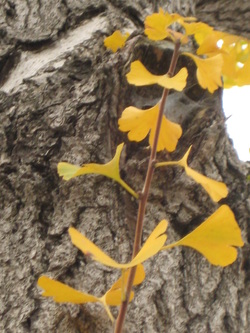
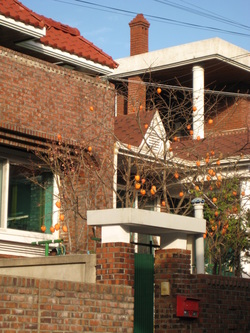
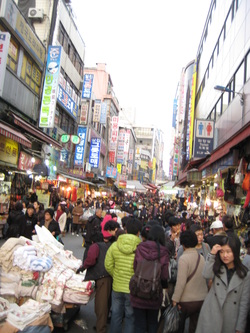
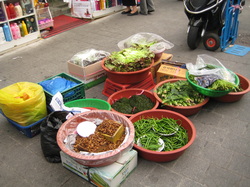
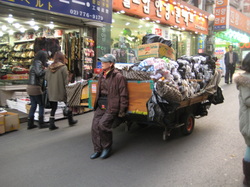
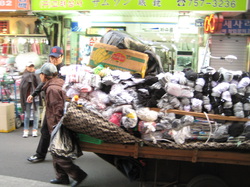
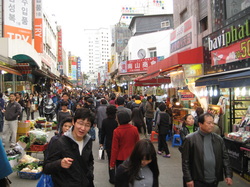
 RSS Feed
RSS Feed